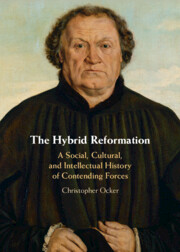Book contents
- The Hybrid Reformation
- The Hybrid Reformation
- Copyright page
- Additional material
- Dedication
- Contents
- Preface
- Part I Indifference and Ambiguity
- Part II Medieval Protestants
- Part III Interpretation beyond Borders
- 7 Erasmus and Biblical Scholasticism
- 8 A Literal Incident, a Spiritual Menace
- 9 The Trouble with Allegory
- 10 Third Forces in a Hybrid Reformation
- Bibliography
- Index
7 - Erasmus and Biblical Scholasticism
from Part III - Interpretation beyond Borders
Published online by Cambridge University Press: 30 September 2022
- The Hybrid Reformation
- The Hybrid Reformation
- Copyright page
- Additional material
- Dedication
- Contents
- Preface
- Part I Indifference and Ambiguity
- Part II Medieval Protestants
- Part III Interpretation beyond Borders
- 7 Erasmus and Biblical Scholasticism
- 8 A Literal Incident, a Spiritual Menace
- 9 The Trouble with Allegory
- 10 Third Forces in a Hybrid Reformation
- Bibliography
- Index
Summary
This chapter views the relationship of humanism to medieval school traditions through the prism of Erasmus, the most outspoken and influential critic of the schools among those who embraced the “new learning” in the early sixteenth century. On close examination, the case of Erasmus suggests a less dichotomous view of intellectual change than polemical rhetoric can imply. The choice between humanism and scholasticism was not absolute. Erasmus illustrates how the new learning aggregated itself to old methods and traditions in theology, without necessarily replacing them.
- Type
- Chapter
- Information
- The Hybrid ReformationA Social, Cultural, and Intellectual History of Contending Forces, pp. 157 - 184Publisher: Cambridge University PressPrint publication year: 2022

